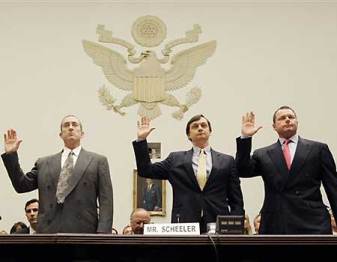A constant refrain that I seem to hear is that churches are too doctrinal or theological and not actively living their beliefs. In other words, it seems that the charge of "dead orthodoxy" is the problem in the church today.
Now, I have no doubt that this may be the case in many churches, but I am just not sure where. Study after study and poll after poll demonstrates that most American Christians have no real grasp of basic doctrines. So why is the charge of dead orthodoxy always being leveled at the church? Perhaps it is because we often see the culture dying and the church seems to not be able to impact our culture. Perhaps we see many churches emptying and dying in themselves. The solution must be to bring moral renewal!

For years we have seen main line Protestant churches attempting to save the world through the "social Gospel" all to fail miserably. In recent decades we have seen the opposite. Conservative Fundamentalist churches have also tried to preserve the culture by becoming legalistic. Their groups are failing as well. For they think they are preaching the Gospel in order to save people from drinking alcohol or saving them from the movie theater. This kind of gospel fails just as well.
Having become a little older in my Christian walk and having been around the theological block so to speak, you see fads come and go. Yes, they come under different disguises. For instance, we now have famous preachers going "green" with the environmental gospel (
Rick Warren) or Emergent Churches trying to be cool. But in the end, they are always the same. Experience is often a good teacher when guided by Scripture.
What is interesting though is that just a little knowledge of church history makes one aware of the many many moral renewal movements that have already taken place and failed to bring about what they promised. For instance, Martin Luther once wrote that the Pope would remember him because unlike the many moralists of his day (yes, there were many reformers in Luther's day) Luther would bring real change through the preaching of the Gospel.
Now this might strike you just a bit odd, for you might be thinking, why wouldn't the gospel bring moral renewal. Yet, whenever I explain the Gospel, the most common argument I receive is "You're saying that you are saved without good works. So then you can say you are a believer and then go kill people!"
Now there will always be false professors of the faith. Yet, in the preaching of the simple Gospel, moral renewal always follows quite naturally or perhaps I should say supernaturally. Allow me to quote a great preacher of the 20th century Martin Lloyd-Jones. You will see history repeating itself even in just the last few decades:
"Take all this new interest in the social application of the Gospel, and the idea of going to live amongst the people and to talk politics and to enter into their social affairs and so on....It was then called the 'Social Gospel', but it was precisely the same thing."
"The same is true of various other agencies that are coming into the life and activity of the Church. What is advocated today as a new approach was practised by what was then called the Institutional church; and this, once more, was done with considerable thoroughness. There were all sorts of cultural clubs in the churches, and the Church became the centre of social life. There were organised games and clubs of various descriptions. All this was given a most thorough trial in the pre-1914 period.
But we are entitled to ask, surely, whether they worked, how effective they were, and what they led to. The answer is that they were failures, they were proved to be failures. I am not so aware in a detailed way of the position in the U.S.A., which I know is somewhat different from that in Great Britain, but I have no hesitation in asserting that what was largely responsible for emptying the churches in Great Britain was that 'social gospel' preaching and the institutional church. It was more responsible for doing so than anything else. The people rightly argued in this way, that if the business of the Church was really just to preach a form of political and social reform and pacifism then the Church was not really necessary, for all that could be done through the political agencies. So they left the churches and went and did it, or tried to do it, through their political parties. That was perfectly logical, but its effect upon the churches was most harmful."
As Rush says, "liberals don't want to be judged by what they produce, but only their intentions." Today we have competition with schools, Focus and other family groups, Fundy Baptists and politicians, Emergent churches and Green gospels and whatever else you could add to the list. They may have "good intentions", but unless we are willing to follow the Biblical model of preaching and forming the local church, in the end we will see conservative churches where England is now. Dead Dead Dead. They will follow Main Line Protestant churches into the grave.
It is not moral renewal that gets a church to walk in the "good works" that the Lord has prepared before hand. It is precisely the Gospel of Sovereign Grace by which a guilty sinner is declared righteous that takes out a heart of stone and puts in a heart of flesh.
Soli Deo Gloria
















